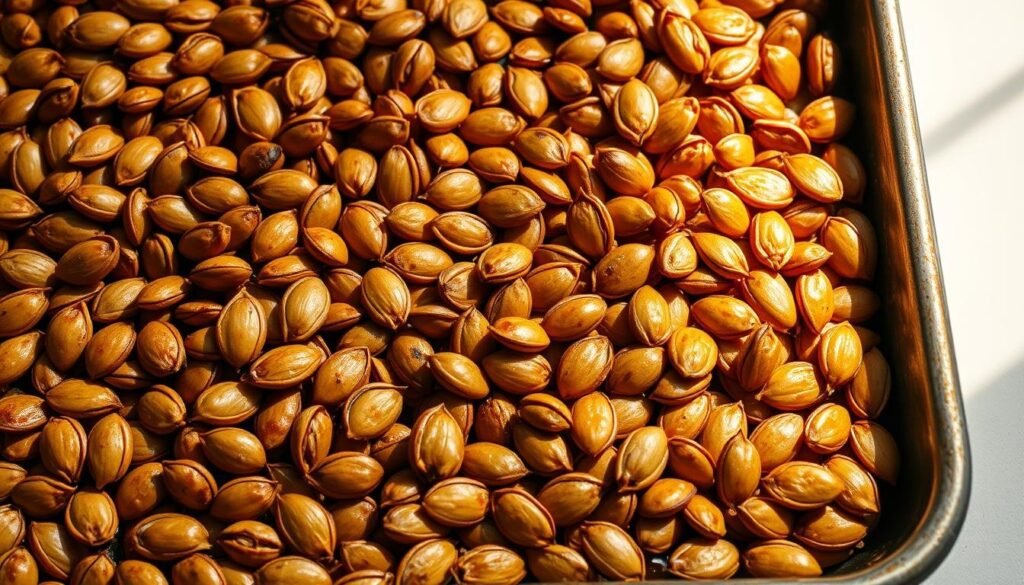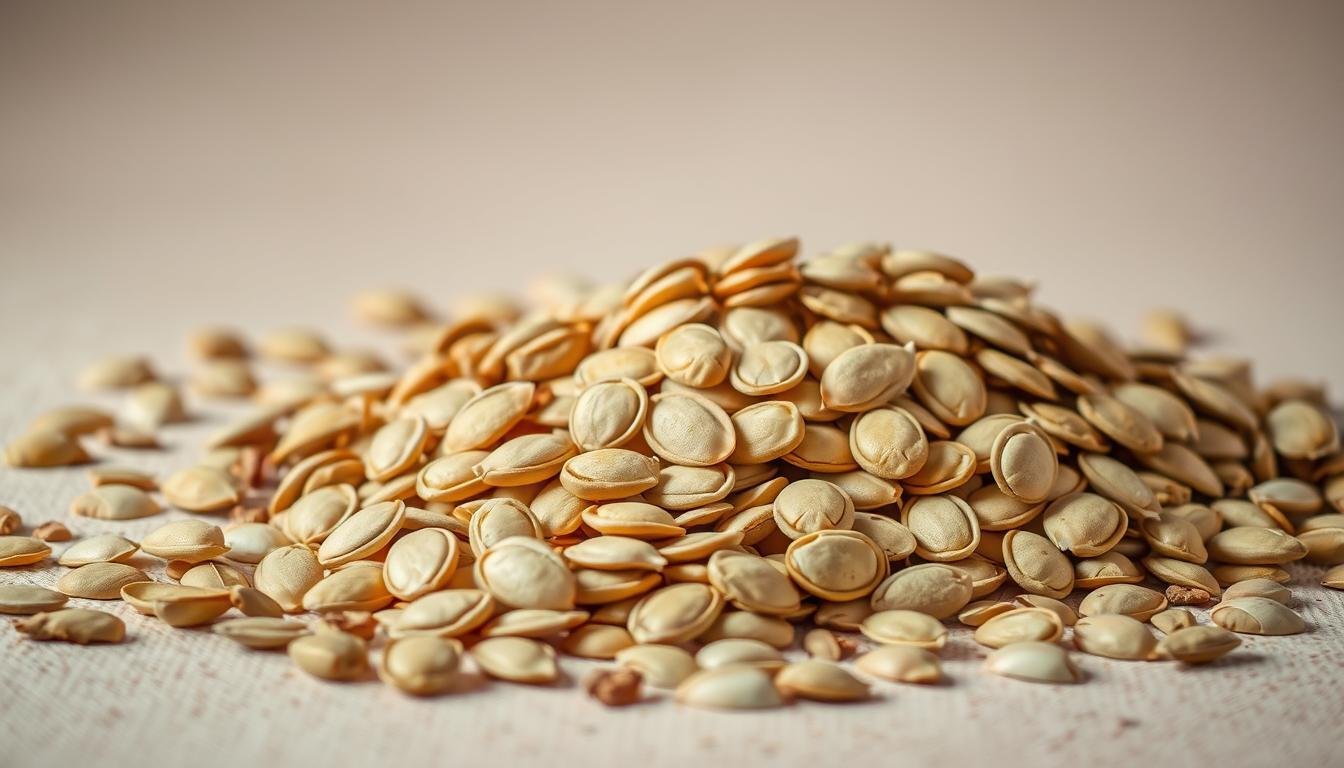Last updated on August 21st, 2025 at 02:45 pm
Eating Pumpkin Seeds: Pumpkin seeds are a snack full of nutrients. They have been enjoyed for centuries. They are rich in protein, healthy fats, vitamins, and minerals.
Eating pumpkin seeds can help your heart and digestion. As you learn more about pumpkin seeds, you will see how versatile they are. They can be used in sweet and savory dishes.
This article will cover the nutritional value and health benefits of pumpkin seeds. It will also show how to add them to your diet. Knowing the value of pumpkin seeds helps you make smart choices for your meals.
Contents
- 1 Can You Eat the Seeds of a Pumpkin?
- 2 Nutritional Profile of Pumpkin Seeds
- 3 Health Benefits of Eating Pumpkin Seeds
- 4 How to Prepare Pumpkin Seeds
- 5 Ways to Incorporate Pumpkin Seeds Into Your Diet
- 6 Incorporating Pumpkin Seeds into a Healthy Lifestyle
- 7 FAQ: Eating Pumpkin Seeds
- 7.1 Are pumpkin seeds safe to eat?
- 7.2 How do I clean and prepare pumpkin seeds for eating?
- 7.3 What are the nutritional benefits of pumpkin seeds?
- 7.4 Can pumpkin seeds help with heart health?
- 7.5 How can I incorporate pumpkin seeds into my diet?
- 7.6 Are there any flavor variations for roasted pumpkin seeds?
- 7.7 Can I eat pumpkin seeds raw?
- 7.8 How should I store pumpkin seeds?
Can You Eat the Seeds of a Pumpkin?
Pumpkin seeds are not only edible but also full of nutrients. Many people throw away these seeds when they prepare pumpkins. They don’t know how good they are for their health.
Pumpkin seeds come from different types of pumpkins. These include those used for cooking, decoration, or carving. While most pumpkin seeds are edible, some taste better than others. For example, seeds from Cucurbita pepo are tasty and nutritious.
| Pumpkin Variety | Seed Edibility | Nutritional Highlights |
|---|---|---|
| Cucurbita pepo | Highly edible | Rich in magnesium and protein |
| Cucurbita maxima | Edible, slightly larger | High in zinc and healthy fats |
| Cucurbita moschata | Edible, nutty flavor | Good source of antioxidants |
To enjoy pumpkin seeds, they need to be cleaned and prepared right. First, rinse them to get rid of any pulp. Then, dry them. Roasting them in the oven with oil and seasoning makes a delicious snack.
Nutritional Profile of Pumpkin Seeds
Pumpkin seeds are packed with essential minerals and antioxidants. They are a great addition to your diet because of their high nutritional value.
Pumpkin seeds are a top source of magnesium and zinc. These minerals are key for many body functions.
Magnesium and Zinc Content
Magnesium is important for muscle and nerve health. Zinc helps your immune system and aids in healing wounds. Eating pumpkin seeds can give you a big part of your daily magnesium and zinc needs.
| Nutrient | Amount per Serving | % Daily Value |
|---|---|---|
| Magnesium | 150 mg | 37% |
| Zinc | 2.5 mg | 17% |
Antioxidants and Phytochemicals
Pumpkin seeds also have antioxidants and phytochemicals. These protect your cells and reduce inflammation. They help keep you healthy and may prevent chronic diseases.
Eating pumpkin seeds is not just a snack. It’s a way to boost your health with all the nutrients they offer.
Health Benefits of Eating Pumpkin Seeds
Pumpkin seeds are packed with nutrients that offer many health benefits. Adding them to your diet can be a great way to improve your health.
These seeds are full of good stuff for your body. They’re especially good for your heart. They have magnesium and zinc, which help keep your blood pressure in check and support your heart.
- Boost your immune system with their zinc
- Support prostate health, which may lower the risk of prostate problems
- Help you sleep better, thanks to tryptophan, an amino acid that aids sleep
Adding pumpkin seeds to your meals is an easy way to get more nutrients. Their health benefits make them a great addition to a healthy lifestyle.
How to Prepare Pumpkin Seeds
To enjoy pumpkin seeds, you must prepare them right. Roasting is a simple way to enhance their taste and health benefits.
Basic Roasting Method
First, rinse the pumpkin seeds in cold water to get rid of pulp or debris. Then, dry them with a paper towel. Mix the seeds with oil and your favorite seasonings.
Place them on a baking sheet in a single layer. Roast in a 375°F (190°C) oven for 20-30 minutes. They should be lightly browned and crispy.
Flavor Variations
Try different seasonings to find your favorite. Here are some ideas:
- Garlic and Herb: Mix minced garlic with chopped fresh herbs like parsley or thyme.
- Spicy: Add a sprinkle of cayenne pepper or red pepper flakes for a spicy kick.
- Lemon Pepper: Combine lemon zest with coarse black pepper for a bright, citrusy flavor.
Here’s a simple table to help you get started with different flavor combinations:
| Flavor Profile | Seasonings | Additional Tips |
|---|---|---|
| Classic | Salt, Pepper | Simple and timeless, perfect for snacking. |
| Indian-Style | Garam Masala, Turmeric | Add a squeeze of lime juice for extra flavor. |
| Mexican-Inspired | Cumin, Chili Powder | Squeeze some lime juice and sprinkle with cilantro. |

Roasting pumpkin seeds lets you be creative with flavors. Don’t be afraid to try new seasonings and spices to find your favorite.
Ways to Incorporate Pumpkin Seeds Into Your Diet
Pumpkin seeds are great for many dishes, from savory to sweet. They can be added to your favorite recipes easily.
Try adding pumpkin seeds to salads for a crunchy texture. They also boost nutrition. Blend them into salad dressings for creaminess.
Use pumpkin seeds in baking too. Add them to muffins or bread for a nutritious twist. They’re especially good with cinnamon and nutmeg, perfect for fall treats.
For a quick snack, make a trail mix with pumpkin seeds, nuts, and dried fruit. It’s a healthy option for when you’re on the move.
Here are more ideas for using pumpkin seeds:
- Add them to oatmeal or yogurt for extra nutrition
- Use them as a topping for soups or stews
- Make a pumpkin seed pesto to serve with pasta or as a dip
Adding pumpkin seeds to your diet brings variety and nutrition to meals. Get creative and find your favorite ways to use them.
Incorporating Pumpkin Seeds into a Healthy Lifestyle
Pumpkin seeds are a nutritious snack that’s easy to add to your diet. They are packed with protein, healthy fats, and minerals. This makes them a great choice for a healthy lifestyle.
Knowing the pumpkin seeds benefits helps you use them to your advantage. You can roast them as a snack or add them to different dishes. This way, you can boost your nutrition.
In short, pumpkin seeds are a great addition to a healthy diet. They add nutrition and flavor to your meals. Try different ways to include them in your diet and see the benefits for yourself.
See Also: Are Prickly Pear Seeds Edible? A Guide
FAQ: Eating Pumpkin Seeds
Are pumpkin seeds safe to eat?
Yes, pumpkin seeds are safe to eat. They are a nutritious snack when cleaned and prepared right.
How do I clean and prepare pumpkin seeds for eating?
First, remove the seeds from the pumpkin. Then, rinse them with water and dry them. After that, you can roast or season them as you like.
What are the nutritional benefits of pumpkin seeds?
Pumpkin seeds are full of magnesium, zinc, antioxidants, and phytochemicals. They are a healthy addition to your diet, supporting your overall health and well-being.
Can pumpkin seeds help with heart health?
Yes, pumpkin seeds may help your heart health. The magnesium and antioxidants in them can reduce inflammation and improve blood lipid profiles.
How can I incorporate pumpkin seeds into my diet?
You can add pumpkin seeds to salads, baked goods, or trail mix. They also make a great roasted snack on their own, adding crunch and nutrition.
Are there any flavor variations for roasted pumpkin seeds?
Yes, you can try different seasonings. Options include garlic, chili powder, or herbs like thyme or rosemary. These can add unique flavors to your roasted pumpkin seeds.
Can I eat pumpkin seeds raw?
While you can eat pumpkin seeds raw, roasting them can make them taste better and feel more enjoyable as a snack.
How should I store pumpkin seeds?
Store pumpkin seeds in an airtight container in a cool, dry place. This helps keep them fresh and preserves their nutritional value.

Hello, I am Bellamy George, a certified nutritionist and food safety specialist from Springfield, IL. With a degree in Food Science, I share research-backed insights on edible foods, seeds, and seafood for safe, informed eating.

